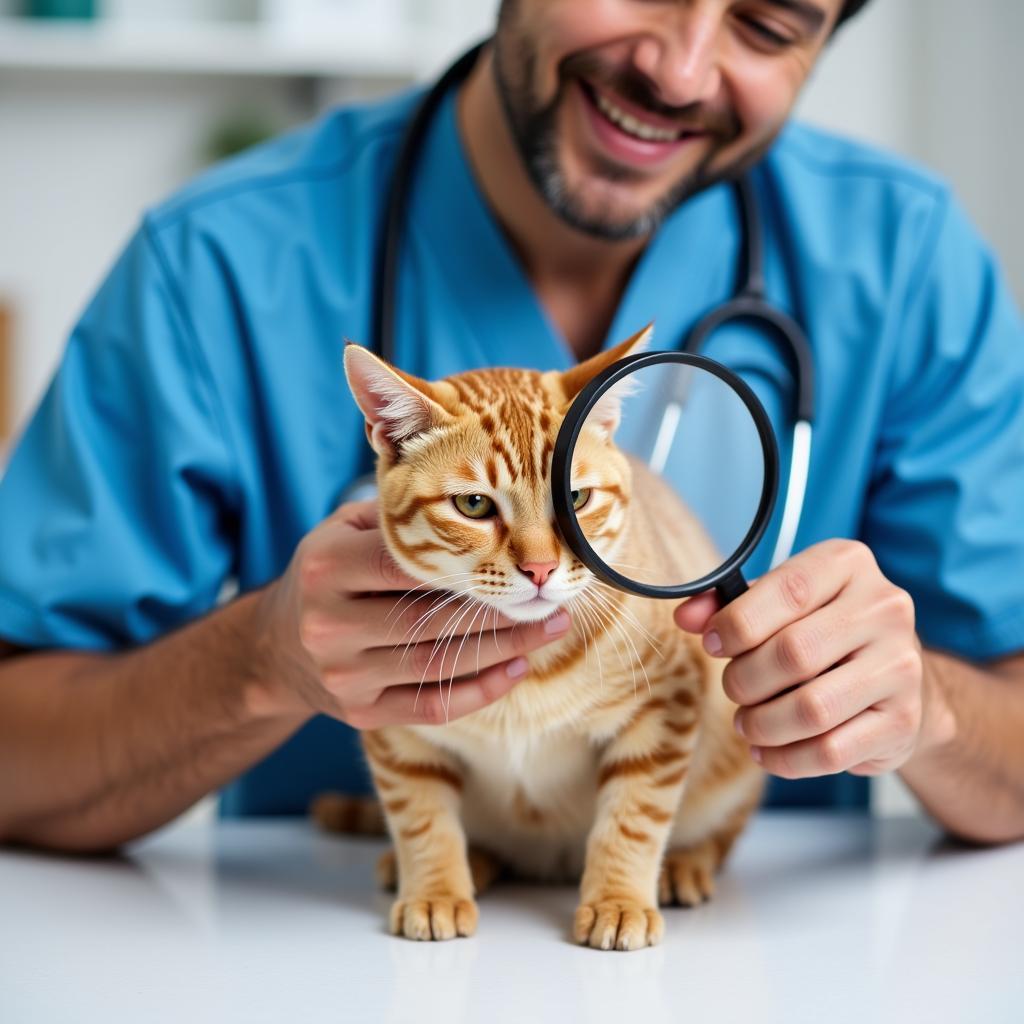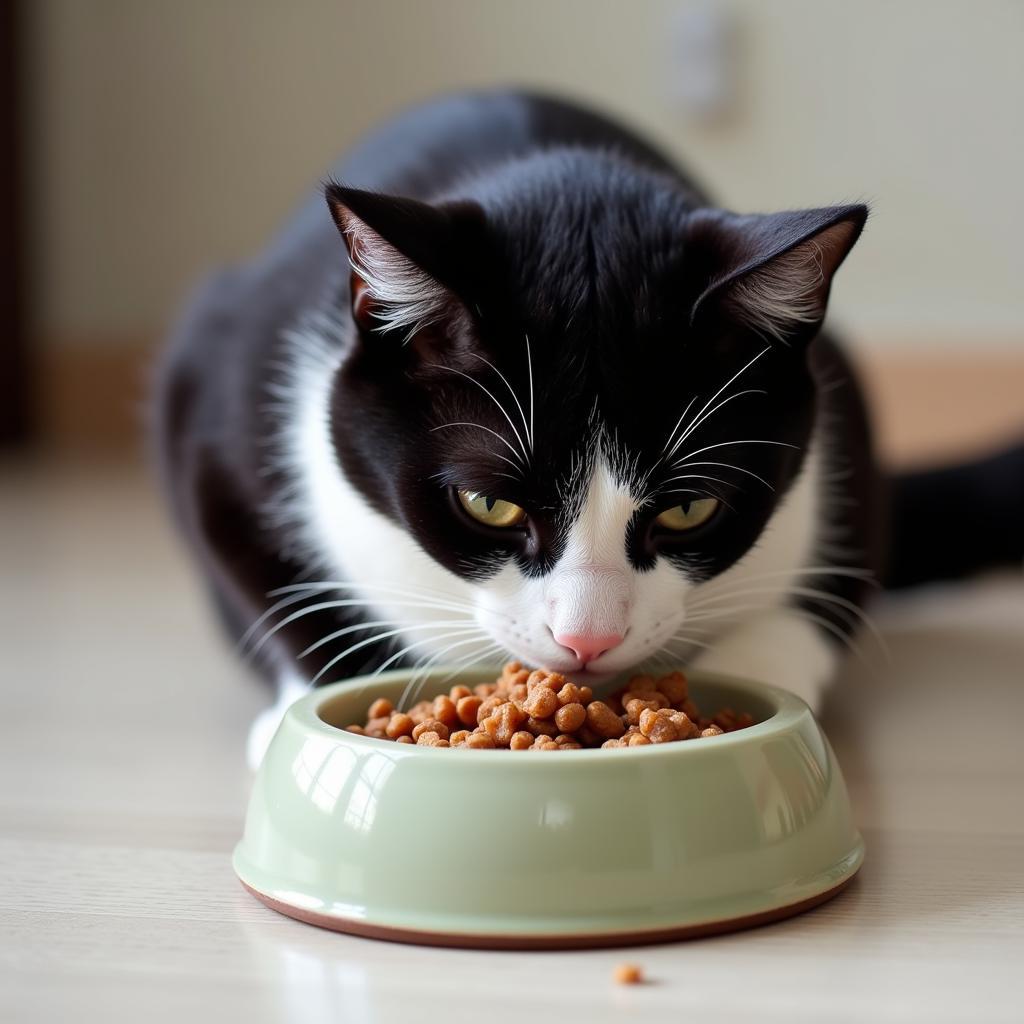Dealing with a cat that can’t stop scratching? You’re not alone. Skin allergies are a common problem for our feline friends, and finding the right wet cat food can make all the difference. Choosing the Best Wet Cat Food For Skin Allergies involves understanding the causes of the allergies and identifying ingredients that will nourish your cat’s skin from the inside out.
Understanding Food Allergies in Cats
Just like humans, cats can develop allergies to certain ingredients in their food. These allergies trigger an immune response, leading to inflammation and those telltale signs of discomfort like itching, scratching, and even hair loss.
Common culprits for cat food allergies include:
- Protein Sources: Beef, chicken, fish, and dairy are common offenders.
- Grains: Wheat, corn, and soy can also trigger allergies in some cats.
- Artificial Additives: Colors, flavors, and preservatives can irritate sensitive felines.
The Benefits of Wet Food for Cats with Skin Allergies
While dry kibble dominates the cat food aisle, wet food offers some distinct advantages for cats with skin issues:
- Higher Moisture Content: Wet food is naturally richer in moisture, promoting hydration and potentially alleviating dry, itchy skin.
- Increased Palatability: Many cats find wet food more appealing, encouraging finicky eaters to get the nutrition they need.
- Reduced Allergen Exposure: Wet food often contains fewer ingredients compared to dry food, making it easier to pinpoint and avoid potential allergens.
Choosing the Right Wet Food: Key Factors to Consider
Navigating the world of cat food labels can feel overwhelming. Here are the essential things to keep in mind:
- Novel Protein Sources: Look for wet foods featuring proteins your cat hasn’t encountered before, such as venison, rabbit, duck, or kangaroo.
- Limited Ingredient Diets (LID): These formulas contain a reduced number of ingredients, making them easier to digest and minimizing the risk of allergic reactions.
- Hydrolyzed Protein Options: In these formulas, proteins are broken down into smaller particles, making them less likely to trigger an immune response.
- Grain-Free Formulas: If you suspect a grain allergy, opt for wet foods that are entirely grain-free.
 Veterinarian examining a cat for allergies
Veterinarian examining a cat for allergies
What About Supplements?
In some cases, your veterinarian might recommend supplements to support your cat’s skin health:
- Omega-3 Fatty Acids: Found in fish oil, these fatty acids can help reduce inflammation and improve skin and coat condition.
- Probiotics: These beneficial bacteria support gut health, which plays a role in immune function and overall skin health.
“It’s important to remember that every cat is unique,” says Dr. Emily Parker, a board-certified veterinary dermatologist. “What works for one cat with skin allergies might not work for another. Working closely with your vet to determine the best dietary approach for your feline friend is crucial.”
Beyond Food: Other Ways to Soothe Your Cat’s Skin
While diet plays a vital role in managing skin allergies, don’t underestimate the importance of:
- Flea Control: Fleas are a common allergy trigger, so maintain a consistent flea prevention routine year-round.
- Stress Reduction: Stress can exacerbate skin conditions. Provide a calm and enriching environment for your cat.
- Regular Grooming: Regular brushing removes allergens and distributes natural skin oils.
 Happy cat enjoying a meal
Happy cat enjoying a meal
Finding Relief: Nourishing Your Cat’s Skin and Spirit
Choosing the best wet cat food for skin allergies is a journey of trial and error. By understanding your cat’s specific needs and working with your veterinarian, you can help your itchy feline find relief and enjoy a healthier, happier life. Remember, a balanced diet is just one piece of the puzzle when it comes to managing skin allergies.
Frequently Asked Questions
1. How long does it take to see improvement in my cat’s skin after switching food?
It can take several weeks (sometimes up to 12) to see noticeable improvements in your cat’s skin after a dietary change. Be patient and consistent with the new food.
2. Can I give my cat human antihistamines for skin allergies?
Never give your cat human medications without consulting your veterinarian. Human antihistamines can be toxic to cats.
3. What are some other signs of food allergies in cats besides itchy skin?
Food allergies in cats can also manifest as vomiting, diarrhea, ear infections, excessive grooming, and respiratory issues.
4. Should I consider a raw food diet for my cat with skin allergies?
Raw food diets can be complex and carry potential risks. It’s best to discuss this option thoroughly with your veterinarian before making any changes.
5. Is it expensive to feed a cat with food allergies?
Specialized hypoallergenic or limited ingredient diets can be more expensive than standard cat food, but investing in your cat’s health is priceless.
Need More Help?
For personalized advice and support in choosing the right wet food for your cat’s skin allergies, contact our team at Mina Cones Food. Call us at 02437655121, email us at minacones@gmail.com, or visit us at 3PGH+8R9, ĐT70A, thôn Trung, Bắc Từ Liêm, Hà Nội, Việt Nam. Our dedicated team is available 24/7 to answer your questions and help you find the best solutions for your furry friend.